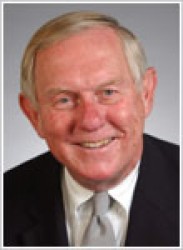So, who will be the next Register of Copyrights in the USA? This is an extremely important job and always a critically important appointment, and especially so at this time.
The last three Registers have been highly respected and each is credited with remarkable accomplishments.
They were:
- Ralph Oman, Register 1985-1993 (above)
- Barbara Ringer, Acting Register 1993-1994
- Marybeth Peters, Register 1994-2010 (above)
Ralph Oman was very instrumental in bringing the USA into the Berne Convention after 102 years of notable absence and playing a key role in bringing copyright law into the trade realm in a reasoned and reasonable way at the time.
Barbara Ringer, who acted for a year, had previously as Register presided over the monumental 1976 revision to the US Copyright, which brought the USA into the modern world of copyright and primed it for Berne ratification a few years later in 1988.
Marybeth Peters, amongst many other accomplishments, saw the evolution of the Copyright Office into the internet age, presided over much needed modernization of systems, implemented the rule making process in the DMCA. played a key role in the TEACH Act of 2002, got the Copyright Royalty Board up and running, and steered a balanced path for the office through various thus far unsuccessful attempts to politicize it, polarize it, swallow it into the Department of Commerce, and generally take away its vitally necessary independence.
All three of these giants were very expert in their field and highly respected by all stakeholders. They were true bastions of balance.
Against this background, read Jamie Love's predictably frank and unsurprising assessment of the current short list, as he sees it, which is not necessarily how I would see it.
Whoever gets this appointment has immense responsibility and should be up to challenge of meeting the standards set by the offices' outstanding recent predecessors as Register.
HK







I'm not sure what balance you mean. The 1976 copyright law, along with the Supreme Court ruling, pulled decades worth of creative works out of the public domain and put them into retroactive copyright, violating the agreement made with the public for their respective copyrights. Before 1976, creators had to actively register their works and had to renew their copyright after 14 years; most did not renew. Works made more than 30 years before this new law were given the new copyright length of the author's life plus 70 years - automatically. This was incredibly one sided with no evidence that it was needed, since significant creative works were already being created.
ReplyDeleteSimilarly, the DMCA is likewise one-sided in favor of copyright holders who can abuse DMCA takedowns even in cases of fair use or to stifle free speech. Just this past week, the Tolkien estate had Zazzle take down a button just for mentioning Tolkien's name (http://tinyurl.com/4f9w3lx).
Can you please elaborate on how any of these Registrar's provided any benefit to consumers as part of this balance?